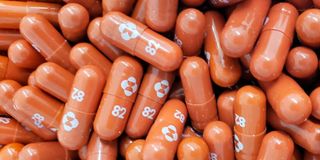Drug company agrees to share Covid pill formula with poor countries

Capsules of the experimental antiviral drug Molnupiravir.
A United States pharmaceutical company has granted a royalty-free license for its promising Covid-19 pill to a United Nations-backed non-profit in a deal that would allow the drug to be manufactured and sold cheaply in the poorest nations, mostly in Africa and Asia.
Molnupiravir, developed by Merck, was this month reported to halve the rate of hospitalisations and deaths in high-risk Covid-19 patients in a large clinical trial.
In a statement published on Wednesday on the Medicines Patent Pool (MPP) website, Merck announced it had signed an agreement to have affordable global access to molnupiravir.
“This agreement will help create broad access for molnupiravir use in 105 low- and middle-income countries (LMICs) following appropriate regulatory approvals,” a statement from the firm reads in part. According to the agreement, companies in the 105 countries will be allowed to sub-license the formulation for the drug.
MPP works to make medical treatment and technologies globally accessible. Affluent nations, including the US, have rushed to negotiate deals to buy the drug, tying up large portions of the supply even before it has been approved by regulators, raising concerns that poor countries would be denied access to the medicine just like they have been with vaccines.
The drug has been filed for emergency use authorisation at the US Food and Drug Administration and is under rolling review at the European Medicines Agency. If approved, it will be the first oral treatment for Covid-19.
“Key features of the licence agreement include technology transfer and a waiver of any exclusivity over test data which is needed to obtain marketing authorisations in countries that grant data exclusivity to the originator. Since molnupiravir is a simple molecule, most generic manufacturers are expected to be able to produce it without the technology transfer and some already do,” a joint statement by Merck and MPP read.
“It will remain royalty-free as long as the World Health Organisation maintains that the pandemic is a Public Health Emergency of International Concern (PHEIC), after which there will be five per cent royalties for the public sector and 10 per cent for the private sector,” the statement added.
Commenting on the move by Merck, consultant pathologist Dr Ahmed Kalebi said: “It is a welcome move but obviously so much needs to come in place before such a move can benefit the poor countries.”
A year ago, India and South Africa called for a Trade-Related Aspects of Intellectual Property Rights (TRIPS) waiver to facilitate the manufacture of treatments locally and boost the global vaccination campaign. Rich countries, among them US, Canada and UK, however refused to waive the rights on Covid-19 vaccines.
The urgency and importance of waiving certain intellectual property rights amid the pandemic have been underscored by the World Health Organization (WHO), health experts, civil society, trade unions, former world leaders, among other notable individuals and groups.
The waiver, if adopted at the General Council of the World Trade Organization (WTO), could help countries around the world overcome legal barriers preventing them from producing their own Covid-19 vaccines and treatments.
“TRIPS waiver was for emergency situations. Covid-19 is serious and unprecedented. So, if we cannot use it now, when or why do we even have it as a provision,” posed WHO director-general Dr Tedros Ghebreyesus.
“Some governments say that TRIPS will not help but the answer is why not try it first,” Dr Tedros added at the launch of the strategy to achieve global Covid-19 vaccination by mid-2022. Early this month, UN secretary-general António Guterres called on countries to review their stand and back the waiver to provide better access to vaccines, medicines, and diagnostics.
“The WHO has shown leadership but has no power to implement the waiver. The power is with manufacturers and countries that can produce the vaccines. It is clear to me that this is the case [access to Covid-19 vaccines and drugs] which requires exceptional rules and norms. It is not business as usual,” said Mr Guterres at the launch of the ambitious plan to vaccinate 40 per cent of the world's population against Covid-19 by end of December 2021 and 70 per cent by mid-2022.





